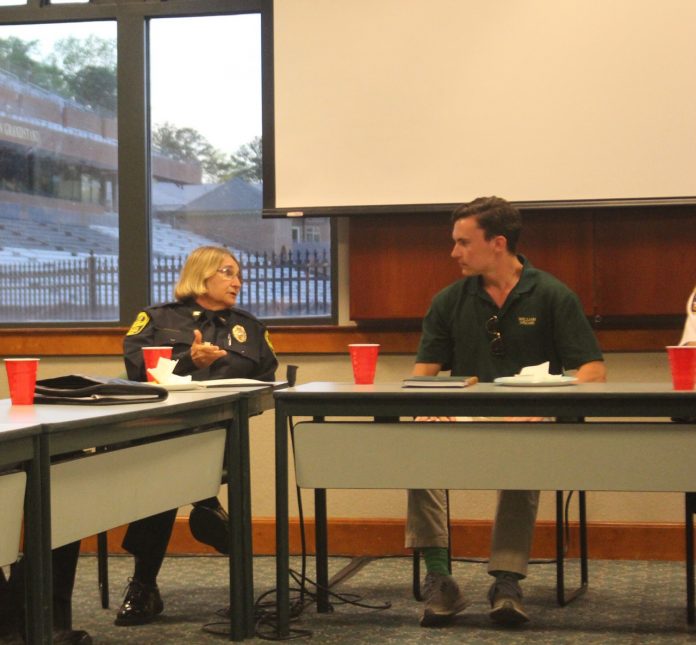TableTalk, a student-led discussion group at the College of William and Mary, brought officers from the William and Mary Police Department and the Williamsburg Police Department April 16 to foster a dialogue between police and students. In the session, students and police officers alike discussed ways of improving the local community.
TableTalk is a relatively new organization at the College and was established in order to foster conversations about issues on campus. Caleb Rogers ‘20, who organized the event alongside other members of TableTalk’s executive board, said that their organization is meant to bring people together.
“It’s basically the idea that, through different ways, how to bring people who wouldn’t normally meet and wouldn’t normally have conversations together, to have those conversations,” Rogers said. “We actually started pretty recently; this has been our first semester in operation.”
Rogers said that TableTalk hosts a variety of different events but that the discussion-style panels tend to be more structured. For this type of event, TableTalk often reaches out to members of the community who may be interested in the conversation scheduled for that event.
“With this Table Talk, we wanted to do the police–student conversation, because it’s not one that happens regularly; it’s certainly not one that happens on a larger stage, and then I know it’s one that the Williamsburg Police Department has been wanting to have for a long time,” Rogers said.
Chief of Police for WMPD Deb Cheesebro started off the discussion by sharing her experiences in policing other schools compared to the College. She explained that the College tends to value its community and peers more than other schools she has worked with throughout her career.
“At William and Mary specifically, I think we tend to look out for each other a lot more; I think students really do care about this community, and that’s something you don’t see at every college or every university,” Cheesebro said. “This, to me, is a very unique setting in that regard.”
Cheesebro also touched on the role the WMPD plays in dealing with mental health on campus, explaining that WMPD works closely with Student Affairs and the counseling center to assist students in a mental health crisis.
“You may not see those numbers, those statistics, but there’s probably not a week that goes by that we don’t do two to three assists, at least, with students who are in a mental health crisis,” Cheesebro said.
Chief of Police for WPD Sean Dunn discussed the strategies students can use to minimize police intervention when partying on the weekends. He explained that communication between students and their neighbors is essential to lowering police intervention and creating mutually beneficial relations between students and the police.
Dunn emphasized that students should inform their neighbors when they intend to hold a party so that their neighbors do not feel the need to file a noise complaint.
“If you’re having an event on the weekend, if you’re having a party, we certainly don’t discourage you having parties, but we recognize that there are noise ordinances, there are quality of life issues,” Dunn said. “And so if you’re going to have that party on a Saturday night, then I really suggest you reach out to you neighbors to let them know what you’re doing.”
“If you’re having an event on the weekend, if you’re having a party, we certainly don’t discourage you having parties, but we recognize that there are noise ordinances, there are quality of life issues,” Dunn said. “And so if you’re going to have that party on a Saturday night, then I really suggest you reach out to you neighbors to let them know what you’re doing.”
Police Lieutenant for WMPD Daniel Salvitti segued the conversation to discuss WMPD’s medical amnesty policy, also known as “Good Griffin,” and explained how the WMPD operates when dealing with medical amnesty.
“In our role, we strictly gather the information, accurately document it, put it in a report and send it to Student Conduct, and they review it,” Salvitti said. “They’ll call everyone involved, speak with them, get their personal knowledge, and then base their actions on that. Our goal is to make sure that, whatever situation we respond to, we’re looking at ensuring that person is safe and getting the services they need.”
Salvitti also clarified WMPD’s policy on arresting students who refuse medical attention under the Good Griffin policy.
“If they refuse medical attention, we’re obligated to make sure that person is safe, so we may have to arrest that person,” Salvitti said. “What we won’t do is leave it with a roommate or someone who isn’t trained, or put that responsibility on students, RAs, staff, or anything like that. So our actions are based on making sure that person’s safe.”
The event gave students and police officers the chance to exchange ideas about outreach, safety and community. Cheesebro also emphasized the positive role of the WMPD in terms of creating a safe community for students on campus.
“When you graduate, I’ll be standing on the other side of the Crim Dell bridge, applauding, high-fiving, shaking hands, because that’s my favorite day of the year,” Cheesebro said. “Because that means you got your education; you were able to focus on what you needed to focus on, and you weren’t worried about your safety, and we were able to get you there.”
“When you graduate, I’ll be standing on the other side of the Crim Dell bridge, applauding, high-fiving, shaking hands, because that’s my favorite day of the year,” Cheesebro said. “Because that means you got your education; you were able to focus on what you needed to focus on, and you weren’t worried about your safety, and we were able to get you there.”

